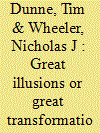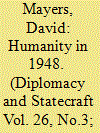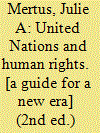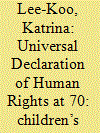| Srl | Item |
| 1 |
ID:
168745


|
|
|
|
|
| Summary/Abstract |
This article considers the impact of digital technologies on privacy and, specifically, the issues arising from metadata. It takes the 2016 Investigatory Powers Act as an exemplar and argues, by reference to European case law, that while data arising from new technologies undoubtedly fall within the scope of privacy protections, there are questions as to the level of protection awarded. Questions arise from how the nature and intensity of intrusion is understood against a backdrop of ‘dataveillance’, as well as the underlying issue of whether ex post controls—through oversight mechanisms—are sufficient to safeguard privacy.
|
|
|
|
|
|
|
|
|
|
|
|
|
|
|
|
| 2 |
ID:
087092


|
|
|
|
|
| Publication |
2009.
|
| Summary/Abstract |
About a month before the 60th anniversary of the Universal Declaration of Human Rights (UDHR), the United States elected its first African-American president, Barack Obama. This historic event, a fitting milestone, brings to life that declaration, which human rights activists and legal scholars regard as the sacred text. Obama's election fulfills a dream of the U.S. civil rights movement, a struggle that relied as much on the UDHR as on the courage of the men and women who for decades fought to make the United States a ''more perfect union.'' For human rights defenders around the world, its significance cannot be overstated.
|
|
|
|
|
|
|
|
|
|
|
|
|
|
|
|
| 3 |
ID:
167208


|
|
|
|
|
| Summary/Abstract |
Human rights have been in the practice of international relations, but they have not been central to academic thinking on International Relations (IR) for most of the century since the discipline became institutionalized in 1919. We suggest two related reasons for this relative neglect by the IR community. First, the US heartland of IR prioritized other institutions of international order during the 1950s and 1960s, primarily the balance of power, diplomacy, and arms control. Second, human rights were treated with suspicion by realists in particular given their view that morality in foreign policy was potentially disruptive of international order. If the emergent discipline of IR largely ignored the 1948 Universal Declaration of Human Rights, so did the rest of the world according to the revisionist history of human rights offered by Samuel Moyn. He challenges the idea that the birth of the regime was the culmination of a 150-year struggle that began in the minds of Enlightenment thinkers and ended with a new globalized framework of rights for all. While IR was slow to come to human rights, the pace in the last three decades has quickened considerably; the area of protecting the basic right of security from violence being a case in point, where several IR scholars have been pivotal in the development of action-guiding theory. Developing a critical theme in Carr’s The Twenty Years’ Crisis 1919-1939, we consider whether these institutional developments represent great illusions or great transformations in international relations in Carr’s terms.
|
|
|
|
|
|
|
|
|
|
|
|
|
|
|
|
| 4 |
ID:
141961


|
|
|
|
|
| Summary/Abstract |
By approving prohibitions on genocide and embracing the Universal Declaration of Human Rights (UDHR), the United Nations in 1948 sustained a theory premised on the centrality of people—both in their collective and individual capacities—that enjoyed primacy over the claims of the sovereign state. This affirmation of human rights dovetailed with the UN’s earlier endorsement of the Nuremberg principles with their emphasis on personal accountability. The melding of privileges and responsibilities gestured toward, although it did not fully encompass, that philosophical line strenuously espoused at the time by the eminent legal theorist, Hersch Lauterpacht: the state is not a sanctified end but merely the custodian of the welfare and ultimate purpose of human beings. This analysis examines the Genocide Convention and the UDHR and brings into conversation their drafting histories, politics, and diplomacy. It traces the saga of two seminal documents and their tandem fates in Cold War America. The collectivist project of the Genocide Convention and the individualistic emphasis of the UDHR are usefully placed in the same analytical frame, something seldom done in the literature that deals with human rights and norms-making of the late 1940s and their interaction with Cold War dilemmas. As peoples and governments pick their way through the hazards of the twenty-first century, it is exigent—for the sake of upright bearing—to stay mindful of the orientation prescribed in the Genocide Convention and the UDHR.
|
|
|
|
|
|
|
|
|
|
|
|
|
|
|
|
| 5 |
ID:
186731


|
|
|
|
|
| Summary/Abstract |
The Universal Declaration of Human Rights (UDHR) is thought to have shaped constitutions profoundly since its adoption in 1948. The authors identify two empirical implications that should follow from such influence. First, UDHR content should be reflected in subsequent national constitutions. Second, such reflections should bear the particular marks of the UDHR itself, not those of the postwar zeitgeist more broadly. The authors examine the historical evidence at various levels to identify and untangle the UDHR's impact. In a macro analysis, they leverage an original data set on the content of constitutions since 1789. They explore historical patterns in the creation and spread of rights, and test whether 1948 exhibits a noticeable disruption in rights provision. The authors build a multivariate model that predicts rights provision with constitution- and rights-level covariates. To gain further analytic leverage, they unearth the process that produced the UDHR and identify plausible alternative formulations evident in a set of discarded proposals. The authors further test the plausibility of UDHR influence by searching for direct references to the document in subsequent constitutional texts and constitutional proceedings. The evidence suggests that the UDHR significantly accelerated the adoption of a particular set of constitutional rights.
|
|
|
|
|
|
|
|
|
|
|
|
|
|
|
|
| 6 |
ID:
102734


|
|
|
| 7 |
ID:
114761


|
|
|
|
|
| Publication |
2012.
|
| Summary/Abstract |
It may not be possible to define Rule of Law with scientific precision but it cannot be dismissed as an elusive notion or as an unruly horse. Rule of Law is the heritage of all mankind because its underlying rationale is belief in the human rights and human dignity of all individuals everywhere in the world. It needs to be emphasised that there is nothing western or eastern or northern or southern about the concept of Rule of Law. It has a global reach and dimension. Rule of Law symbolises the quest of civilised democratic societies, be they eastern or western, to combine that degree of liberty without which law is tyranny with that degree of law without which liberty becomes licence. It is entrenched in India to the extent that the Rule of Law cannot be abolished even by a constitutional amendment.
|
|
|
|
|
|
|
|
|
|
|
|
|
|
|
|
| 8 |
ID:
091630


|
|
|
|
|
| Edition |
2nd ed.
|
| Publication |
London, Routledge, 2009.
|
| Description |
xxii, 202 p.Hardbound
|
| Series |
Routledge global institutions ; 33
|
| Contents |
Includes bibliographical references and index.
|
| Standard Number |
9780415491327
|
|
|
|
|
|
|
|
|
|
|
|
Copies: C:1/I:0,R:0,Q:0
Circulation
| Accession# | Call# | Current Location | Status | Policy | Location |
| 054537 | 341.48/MER 054537 | Main | On Shelf | General | |
|
|
|
|
| 9 |
ID:
122438


|
|
|
|
|
| Publication |
2013.
|
| Summary/Abstract |
Whereas recognition of the inherent dignity and of the equal and
inalienable rights of all members of the human family is the foundation
of freedom, justice and peace in the world,
Whereas disregard and contempt for human rights have resulted in
barbarous acts which have outraged the conscience of mankind, and
the advent of a world in which human beings shall enjoy freedom of
speech and belief and freedom from fear and want has been proclaimed
as the highest aspiration of the common people.
|
|
|
|
|
|
|
|
|
|
|
|
|
|
|
|
| 10 |
ID:
167538


|
|
|
|
|
| Summary/Abstract |
This commentary reflects on the legacy of the Universal Declaration of Human Rights on its 70th anniversary, in terms of the protection of human rights within Australia. I reflect on Australia’s failure to implement domestically the terms of the two founding Covenants, and the resulting piecemeal protections that exist for human rights. I finish by considering the growing complexities in understanding human rights, responsibilities, and limits.
|
|
|
|
|
|
|
|
|
|
|
|
|
|
|
|
| 11 |
ID:
167539


|
|
|
| 12 |
ID:
167540


|
|
|